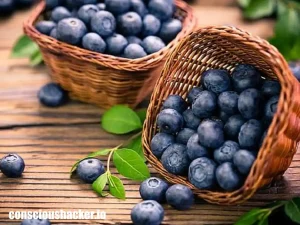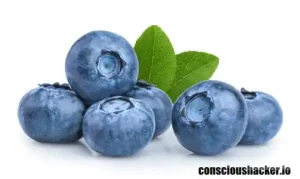Blueberries are small, round berries known for their sweet and tart flavor. They are an exceptional source of various essential nutrients. However, when we think of blueberries, we often wonder whether they have seeds or without seeds. Let us show you the facts about blueberries’ number of seeds, how to plant them, and how to take advantage of blueberries, especially for human health.

Do blueberries have seeds? The features of blueberries
The blueberry bush belongs to the Vaccinium sect. Cryptococcus is a flowering shrub that produces berries with a purplish-blue color, commonly known as blueberries.When they first appear, they are green, and as they mature, they darken to shades of purple and blue. This plant is closely related to other shrubs that yield cranberries and huckleberries.
Blueberries are tiny, typically measuring 0.2-0.6 inches in diameter, and have a flared top. Additionally, blueberries comprise about 85% water, and a whole cup amounts to only 84 calories, containing 21.5 grams of carbohydrates.
The two most prevalent types of blueberries are the high bush blueberries, which are widely cultivated in the United States, and the low bush or “wild” blueberries, which are smaller and contain higher levels of certain antioxidants.
Facts about blueberries seeds
Regarding the seeds blueberries do have seeds, but they are tiny and often go unnoticed when we eat them. It contains seeds, from 20 to 50 seeds per blueberry, depending on its size and variety. These seeds inside are tiny, almost microscopic, and distributed throughout the fruit’s flesh.
While blueberries naturally have seeds, some cultivated varieties, such as low bush blueberries, have fewer seeds than other types. These varieties are often called “seedless” blueberries, but they still contain some seeds, albeit in smaller amounts.
Blueberry seeds are safe to eat and can be consumed with the fruit. However, some people may prefer to avoid eating the seeds due to their tiny roots and somewhat gritty texture. It is possible to extract the seeds from blueberries if you want to grow your blueberry plants from seed. However, the process can be tedious as the tiny seeds require careful extraction.
How to extract blueberry seeds from blueberries?
For blueberry seedlings, it is recommended to use seeds from hybrid high bush blueberries or the seeds of wild blueberries. It is also important to note that not all seeds will germinate, and the seeds may take a while to sprout. Blueberries grow best in acidic soil with good drainage and total sun exposure. It also requires providing a period of cold stratification by refrigerating them for a few weeks before planting.
Generally, to extract blueberry seeds, you can start by mashing the berries gently to separate the seeds from the pulp. Then, you can collect the seeds and remove any excess pulp by rinsing them with water. After that, you should dry the seeds then plant the seeds.
Here are some alternative methods you can try to grow new blueberries by hand:
Using a blender to extract blueberry seeds
Using a blender is a popular method for extracting blueberry seeds. Blend the blueberries until they become pulp-like, and then strain out the seeds using a fine-mesh sieve or cheesecloth.
Using a potato masher to extract blueberry seeds
Another method is to use a potato masher to gently mash the blueberries, separating the seeds from the pulp. Afterward, you can carefully pick out the seeds from the mashed blueberries.
Other tools or techniques for seedling blueberry seeds
You can also use a food grinder, mortar, and pestle to separate the seeds from the pulp. Additionally, freezing the blueberries before extracting the seeds can make the process easier.
The benefit of the blueberry plant in life: eat blueberry seeds
While the seeds of blueberries are tiny, they also contain beneficial nutrients. Every single blueberry is delicious and packed with nutrients that are beneficial for human health.
Some critical nutrients in blueberry fruit include vitamin C, vitamin K, manganese, and dietary fiber. Here are several main benefits of consuming blueberries:
1. High in antioxidants: Blueberries are rich in antioxidants, particularly anthocyanins, which help to protect the body against damage from free radicals and reduce inflammation.
2. Brain health: Studies have demonstrated that the presence of antioxidants in blueberries can enhance cognitive abilities and slow down the brain’s aging process. They may also improve memory and reduce the risk of developing mental diseases such as Alzheimer’s.
3. Heart health: Blueberries have been linked to promoting heart health; the antioxidants and flavonoids found in blueberries can help reduce the risk of cardiovascular diseases by preventing oxidative stress and inflammation in the body. It also helps to lower blood pressure and improve blood flow.
4. Cancer prevention: Cups of blueberries are also rich in antioxidants, specifically anthocyanins, known for their heart-protective effects. Some studies suggest that the phytochemicals in blueberries may help prevent certain types of cancer, such as colon, breast, and prostate. These compounds have been found to inhibit the growth of cancer cells and reduce the risk of tumor formation.
5. Digestive health: Blueberries are beneficial for digestion and help maintain regularity in bowel movements due to their high dietary fiber content. They also contain compounds that help promote beneficial gut bacteria growth.
6. Eye health: The antioxidants in blueberries, particularly lutein, and zeaxanthin, are beneficial for eye health. They may help to reduce the risk of age-related macular degeneration and cataracts.
7. Diabetes management: Blueberries have a low glycemic index, meaning they have a minimal impact on blood sugar levels. They contain compounds that may help to improve insulin sensitivity and control blood sugar, making them suitable fruit for diabetic individuals.
8. Skin health: The antioxidants in blueberries play a role in maintaining healthy skin by protecting against damage from UV rays and reducing the signs of aging, such as wrinkles and age spots.
It’s important to note that they are rich in healthy fats, which provide essential fatty acids for overall health. As a result, they ought to be ingested as a component of a well-rounded diet and a general wholesome way of living.

